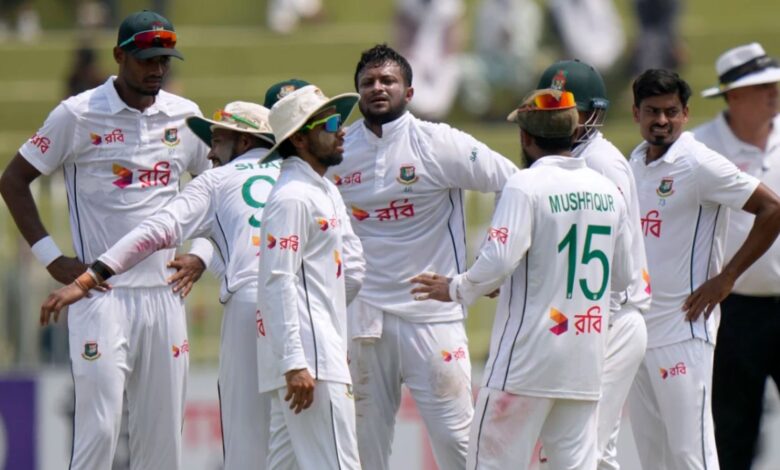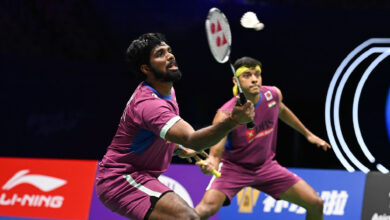The duality of Shakib Al Hasan: Accused of murder, inspires Bangladesh to first Test win in Pakan | Cricket News

Around 48 hours after he was accused of murder during the recent protests and violence in Bangladesh which left hundreds dead, Shakib Al Hasan flashed a beaming smile as he hugged his teammates in the Rawalpindi dressing room. Bangladesh’s greatest-ever cricketer had played his part on the final day, snaring three wickets to help script their maiden Test win in Pakan.It left the country’s massive fan base in a dilemma – one they have battled for most of his 18-year career – should Shakib be celebrated or condemned?
The only player to amass over 14,000 runs and 600 wickets across international formats, Shakib has done more than most to highlight Bangladesh on cricket’s world map. But then, there have been several occasions when he has been suspended his own board, and the ICC – including, but not limited to, failing to report multiple approaches bookies.
Back home, he was once seen as a man of the people. When almost all of Bangladesh took to the streets to celebrate Argentina’s FIFA World Cup win, Shakib joined the masses, wearing the famous blue-and-white jersey. But then one comes across a video where he slaps a loyal asking for a selfie.
It all reached a crescendo recently when Bangladesh was plunged into instability, after a youth uprising followed an ousted government. Shakib, a member of former Prime Miner Sheikh Hasina’s Awami League Party, was called out members of the opposition and new dispensation for being absent and mum during the momentous days.
Is he misunderstood as a person? Or what we see of him is who he really is? Nazmul Abedeen Fahim, Shakib’s long-time mentor, takes some time before responding in his deep voice, “Very much.”
As hard as it may be to picture now, “before the middle part of his career, Shakib to me was a naive, simple, straightforward cricket loving guy,” Fahim told The Indian Express before this year’s T20 World Cup. “Who had nothing else in his mind other than cricket. Nothing else.”
Introvert
Casting his mind back to the early 2000s at the Bangladesh Krira Shikkha Prothan – the national sports institute which has moulded the likes of Mushfiqur Rahim, Litton Das, Soumya Sarkar, and Shakib – Fahim recalls a teenager with “nothing exciting about him, to be honest. He was one of many.”
“Shakib was lean and not very strong, and not very vocal, because he was in a cadet college sort of environment, where if you’re a junior, you remain quiet. He was very quiet and calm and stayed within himself.”
As hard as it may be to picture now, “before the middle part of his career, Shakib to me was a naive, simple, straightforward cricket loving guy, who had nothing else in his mind other than cricket. Nothing else,” says Shakib’s mentor, Nazmul Abedeen Fahim (right).
It was owing to this reserved nature that Fahim realised a lot later that the introverted talent had fire in his belly.
Arrogance
During the T20 World Cup this year, Virender Sehwag didn’t hold back in bashing the all-rounder for his shot- selection in a game against South Africa, almost to the point of calling it arrogant. “You are not Gilchr or Hayden. You are just a player from Bangladesh. Play according to your standards,” the former India opener had said on Cricbuzz.
It is only fair then, that one looks at it from Bangladesh’s perspective. “It’s not very common, not very natural or easy – the arrogance he shows on the field, being a Bangladeshi player, from a team inferior to others,” says Fahim.
“When he goes in, he wants to be the central figure. That’s not very usual. Someone coming from a team, from a place, where the hory of cricket is not that great. That’s where he’s so exceptional… His thinking is different. That’s what has made him better than other players. We had players who were technically better, physically stronger but didn’t make as good as Shakib.”
Is it the trait that has made him so popular in Bangladesh? “Of course. Bangladesh doesn’t have many public figures of that kind. People are looking for someone. He certainly has been one. It’s always a dream come true when Bangladesh does well on the field. And whenever it has, Shakib had something to do with it. So it was easy for him to win the hearts of millions and become a role model. Over here, people name their children after him. Everyone wants their child to become like him.”
Commitment
Days after that ‘questionable’ shot, Shakib would play an ‘unusual’ innings against the Netherlands. “He didn’t play one uppish shot. He made sure he went through the innings quietly. That’s very hard at this part of his career. Someone who’s very arrogant, loves to play his shots, dominate, and doesn’t show much respect to the bowlers. It shows his determination, his willingness to do well for the team, even at this stage in his career.”
The 37-year-old ex Bangladesh captain, a former lawmaker in the Sheikh Hasina-led Awami League regime, was among 147 people against whom charges have been filed for an alleged murder during the protests in early August. (File)
But doubts over Shakib’s commitment have been raised for the past few years now, even the BCB. Especially since he took to politics. Cricket still remains the first thing on Shakib’s mind. It’s just not the only thing.
Fahim wishes his ward had fewer things on his platter. “I wanted to see him finish a good cricketing career well. That is his identity. When he finishes his game, people should know him as a cricketer, who achieved these highs. Not as a politician or how much money he has. His contribution is as a cricketer, how much he has entertained the people. That should be the main agenda for him.”
Mreated
Shakib has captained the national team in one of every three games he has played across formats. When he hasn’t held the reins, the all-rounder has remained front and centre in some of Bangladesh’s greatest moments over the past decade. Be it the 2012 Asia Cup campaign, where they fell one win short of lifting the title or the 2017 Champions Trophy – the first time they made it to an ICC tournament semi-final. Or Sunday’s horic triumph. His most memorable performance though, came during the team’s underwhelming 2019 World Cup campaign, where he became the first cricketer to score 500 runs and take 10 wickets in a single top-level ODI tournament.
Through those years, Bangladesh lifting a big trophy had always felt around the corner. It never came. Fahim believes it’s where the board missed out on making the most of a golden generation of players, including of course, Shakib.
Despite Bangladesh’s poor run at the 2019 ODI World Cup, Shakib was a standout performer during the tournament – the first cricketer to score 500 runs and take 10 wickets in a single top-level ODI tournament. (FILE)
“They were not treated the way they should’ve been. They were not recognized for what they had achieved, which could’ve motivated them to do even better. To become more hungry. That was a phase when Bangladesh was really growing, and since 2017-18 we’ve sort of been on a decline. That was a mishandling of the players, not creating the right atmosphere,” he says.
Fahim believes it’s also what flicked a switch in Shakib, a feeling of his extensive body of work for Bangladesh cricket not being reciprocated for.
“He was suspended the cricket board. That changed him. He felt insecure, disrespected, he felt unappreciated. His thought process, life philosophy, everything changed. When you’re cornered, a defense mechanism comes, one way or another. His responses were different. He started to be a bit rough, probably to protect himself. He started to be a bit bold. Now that sense of naivety was not there anymore. He became less accessible and started to realize his value. So he started behaving in a way which went with that value. Some people started to misunderstand him. And there was no effort from his side to cover it up.”
Why? “He is the kind of guy who expects that ‘I’m doing my part, I want everyone to appreciate that. When my good deeds don’t give me in return what I deserve, I’m not going to give any clarification for that.’ That’s how he feels. It’s a sentimental thing.”







